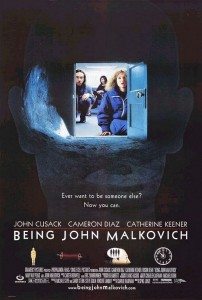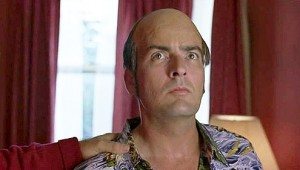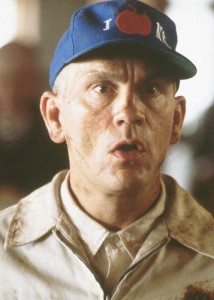When I first saw Being John Malkovich in ’99, I felt as though my brain had been violated in the same way Malkovich’s was in the movie. It was as though someone had stolen into my head and used it to concoct this movie without my knowing anything about it. It was like the deepest, weirdest part of my creative mind, the shed in the back of the yard wherein my oddest ideas are safely locked away, had been broken into and raided. I don’t mean I’d ever thought up the scenario of Being John Malkovich. I mean the movie made a kind of perfect logical sense to me that I’d never really seen before outside of my own head. It tapped into something I’d thought private. Which kind of freaked me out at the time.
When it came out, people were prone to ask, “I wonder what famous person it was originally written for? Or was there just a blank space in the title to be filled in based on whoever they could cast?” I don’t know how I knew—something to do with the brain issue above—but I knew it was conceived and written as Being John Malkovich. I had no doubt. Malkovich has a particular quality, not one I can define or even name, but it’s tangible, and there’s no reason anyone would think up this movie with anyone else in mind. Charlie Sheen as his best friend? Genius casting, but unlike Malkovich, I could see that character having been written for someone else (Kevin Bacon in the original script, it turns out).
One studio executive, in turning down the script, said, “Why the fuck can’t it be Being Tom Cruise?” What can one say? Studio executives are their own cliches.
Everything about the movie is unusual. Finding a tiny door on the 7 ½ floor opening onto a long, spacially-improbable dirt tube leading into the consciousness of John Malkovich is only the most obvious bit of weirdness. Weird too is the character Craig Schwartz (John Cusack), who at first you feel for, he’s a struggling artist who just wants a chance to show his work to the world. Then almost immediately he hits on a woman at work, Maxine (Katherine Keener), makes a date with her, tells her he loves her. Problem is, his wife Lottie (Cameron Diaz) falls in love with Maxine too, but Maxine’s only cool with it when Lottie is inside Malkovich. Insane with jealosy, Craig ties Lottie up at gunpoint and locks her in the chimp cage so he can fool Maxine into falling for him (while he’s inside Malkovich). Which is to say, Craig’s not a likable guy. He’s desperate and selfish and awful. He takes over Malkovich’s body once he sees it’s the only way Maxine will love him, without the slightest concern for the much abused Malkovich.
Maxine is even less likable. I mean she’s magnetic and sexy, but she’s purely evil and interested in only one thing: manipulating other people. Lottie is more or less the only innocent, but she’s ultimately just as selfish as the other two.
That’s an unusually unpleasant trio of characters to be dealing with. And still the movie works.
Story-wise, it never stops surprising. It’s hard to think of any other movie that keeps coming up with new ideas all the way to the end the way this one does. It was Charlie Kaufman’s first produced screenplay. It’s very smart in how every angle of the concept is explored. Everything you want to happen in the movie happens. What if Malkovich enters his own tube? Good question. The Malkovich Malkovich scene that follows is brilliantly simple and terrifying. “I have been to the dark side. I have seen a world no man should see!”
The details make the movie. Craig the frustrated puppeteer watching hugely famous Derek Mantini on TV performing another bit of outrageous stunt-puppeteering. The video, apparently made in the ‘70s, explaining the existence of the 7 ½ floor. “From now on there shall be at least one place on God’s green Earth you and your accursed kind can live in peace!” Craig’s puppet dancing the “Dance of Despair And Disillusionment” to open the movie, and Craig as Malkovich dancing the same dance for Maxine. The video at the end detailing Malkovich’s rise to puppeteering stardom.
For a comedy, even a weird, grim one, it’s unusual in how dark and dreary it looks. Director Spike Jonze does everything he can to normalize the proceedings. There are no wacky shots or weird angles, no trippy lighting or violent music cues. Everything is presented as matter-of-fact. Lighting is barely present. Craig and Lottie’s apartment is messy and cramped. The exteriors are few and bland. The music, by Carter Burwell (of Miller’s Crossing and other Coen Bros. movies fame (not to mention another 80 odd credits)), is subtly mysterious and sad.
As desperate and pathetic as Craig is, I still feel for him at the end, the poor bastard. Not to mention feeling for Malkovich. The saddest moment in the movie is when, after controlling Malkovich for eight months, Craig finally exits. Malkovich looks in a mirror, and realizes he’s free. You feel his profound relief–he is himself at last! Which feeling lasts all of three seconds before Lester and his companions crawl into his consciousness to set up shop permanently. As for Craig, he apparently tries to get back inside Malkovich, but unbeknownst to him, the portal into Malkovich closed as of midnight, and he’s shunted into the new vessel, Maxine’s baby, where he will be imprisoned, unable to control her, for the rest of her life.
Nothing Kaufman or Jonze has done since Being John Malkovich has toyed with my brain in the same way. Their one other collaboration was Adaptation (’02), which I find to be kind of a dud with some nice bits here and there. It fell into the post-modernist trap of imagining that by commenting on its own crappy Hollywood ending, it could get away with a crappy Hollywood ending, which it couldn’t, because crappy is crappy.
Kaufman also wrote the beloved Eternal Sunshine of The Spotless Mind (’04), which I didn’t thrill to the way many did. The Jim Carrey factor was hard to get past. I suppose I might rent it again soon and give it another chance.
Kaufman directed his own script of Synecdoche, New York in ’08. Fancy-pants critics liked it. No one else did. It too is chock full of weird ideas, but they never amount to anything satisfying. It makes me wonder how much Jonze added to Malkovich. The original script is very different from the final movie, with a last third that’s totally bonkers. You can read it here. Presumably Jonze and Kaufman worked together to create the much simpler ending seen in the finished movie.
Jonze has a new movie he wrote and directed coming out later this year. Kaufman no doubt has projects in the works as well. I’m always curious to see what both of these guys come up with. If they ever top Malkovich, it will be a happy day indeed.











Eternal Sunshine is worth another chance. Just forget it’s Jim Carrey as much as possible. Being John Malkovich will be one of those films that people still watch in 50 years. Like Metropolis. Just too weird and yet it totally works.
if you have a bit of time, you should check out the link to the script. there are differences throughout, but towards the end it’s a completely different movie, one far weirder than what they made. i had no idea.
I should probably watch it again first.
Glad you mentioned the Carter Burwell score. Along with “Miller’s Crossing,” this score is one of my all time favorites.
“Eternal Sunshine” is good, not great. But much better than most movies (which makes it seem better than it is). It’s got parts that are heartbreakingly amazing and cruel and sad — moments that stick with me like few movies ever have (especially Kate Winslet being torn away from him under the bed sheets, which crushed me).
Winslet is predictably incredible. Perhaps one of the best performances of her career (surpassed only by “Heavenly Creatures”).
And yes, it’s tragic that Carrey is in the damn thing. Watching it, I kept wishing someone like Phillip Seymour Hoffman was in the role. But regardless, in a world where “Django Unchained,” “Silver Linings Playbook” and “Argo” are hailed as great pieces of cinema, “Eternal Sunshine” stands head and shoulders above it. And unlike those films, this one aged quite nicely.
His scores for Blood Simple and Raising Arizona are also worth owning. Comes on one CD. Blood Simple is stripped down and haunting. Arizona is damned goofy, particularly the supermarket version of the theme.
I just watched Eternal Sunshine for the first time since it came out, and I liked it a lot more than I recall liking it back then. It has its weaknesses, but overall it really captured the sadness of a messed up relationship falling apart, and did it in a cinematic way unique to Kaufman. Of course Gondry’s direction helps too. He has a knack for using simple effects well (which I recall him overdoing in a big way with Science of Sleep). Still not a fan of Carrey, but he’s never been less annoying than in this one, and Winslet is indeed excellent.
The ending is also pretty perfect in an unexpected way. I think it manages to say something about love that’s completely contrary to the usual Hollywood fantasy and is simultaneously completely true.
What’s a “CD?”
I think you get them from the bank.
I just have to add this is too weird for me to accept as legitimate. I mean, how did this curse begin? What would happen if these dazed and disoriented people fall INTO traffic? What would happen if Emily decided to go be a jihadi bride and had her head cut off in Syria? You can’t just tell me people can invade other peoples’ heads and get away with it and then do it again to the same people you framed a generation before… Sorry, I’m going to try watching 12 Monkeys again and pretend to be the toothless time bum who smiles at Bruce Willis as he remembers hearing the time tracking device is in the teeth. Or something Brad Pitt did while on acid after being committed to the looney bin for Se7en… Wait… So that’s why he was in the insane asylum! Now that’s weird I can accept as legitimate!
Malkovich has been inside Brad Pitt’s head for years, man. You think a guy like Pitt just comes along by accident? He’s one of Malkovich’s art projects. Same with Scarlett Johansson, Jim Carrey, Dick Cheney, Kanye West, the list goes on and on. Hence the irony of making a movie about other people inside Malkovich’s head, controlling him. Sometimes you have to look at the big picture to understand these things.